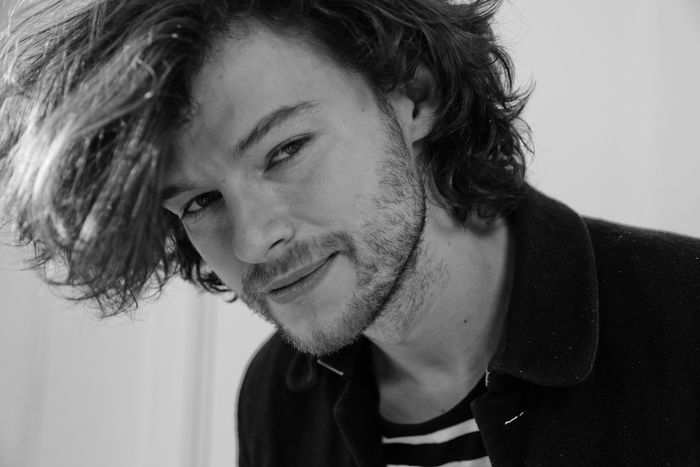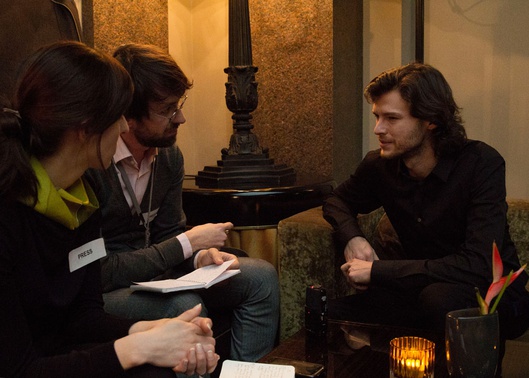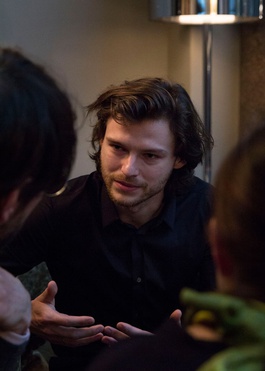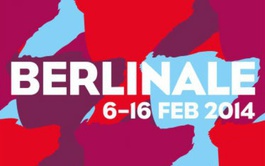
'I want to be whatever I want to be': Berlinale's Darling Mateusz Kościukiewicz
Published on
The European Shooting Star 2014 Mateusz Kościukieiwcz has been the face of Poland on Berlinale ever since 2011. Despite being currently maybe the most prominent actor of the Polish alternative cinema, Kościukiewicz avoids celebrity life and finds refuge in places where ‘nobody likes him’. Interview
Kościukiewicz’s was one of the richest filmographies among the European Shooting Stars. He took part in Peter Greenaway’s and Andrzej Wajda’s films and had leading roles in ceveral celebrated films: Małgośka Szumowska’s controversial film In the Name Of which won the Teddy award last year, Baby Blues (2012) that received The Crystal Bear and Suicide Room that was nominated for the Teddy award in 2011.
Cafebabel: Most of your films have been, at least for me, somewhat specifically Polish – with a particular historicity, certain aesthetics, certain brutality. Do you find this particularly important?
Mateusz Kościukiewicz: Poland a strange country, a country of many differences, many clichés and many oppositions. It is a very catholic country which now tries to be more open, while still being homophobic, nationalistic, with one leg in Europe, looking forward to modern times and not wanting to be left behind, and another leg in the old times. Many people have the feeling it used to be better during communism. While the truly free culture was forced into underground, there was still a social safety net. Obviously, these tensions have an effect on what we see happening in the Polish cinema.
We are in the process to change the society that is still fascinated with an ideal of a wartime character sacrificing his or her life for the nation. But today young people in Poland don’t want to die. We want to live. I want to be whatever I want to be: gender, homosexual, whatever.
Can cinema facilitate this change?
 Cinema has a limited influence on society. As with other cultural forms, such as books and theatre, it depends on the actual exposure which remains limited to the more urban layers of society. Many people are not exposed to the new critical cinema. Either because they don’t want to or don’t have access to these films. I come from Nowy Tomyśl, a very small town, and I see the cultural infrastructure there still retains the form it had in the times of communism. I assume the situation in most of the places apart from the bigger cities is similar. As filmmakers, we feel that many people want to go to the cinema, but aren’t able to do that. But the situation has been improving gradually. But to be honest, I am not sure cinema can change the society.
Cinema has a limited influence on society. As with other cultural forms, such as books and theatre, it depends on the actual exposure which remains limited to the more urban layers of society. Many people are not exposed to the new critical cinema. Either because they don’t want to or don’t have access to these films. I come from Nowy Tomyśl, a very small town, and I see the cultural infrastructure there still retains the form it had in the times of communism. I assume the situation in most of the places apart from the bigger cities is similar. As filmmakers, we feel that many people want to go to the cinema, but aren’t able to do that. But the situation has been improving gradually. But to be honest, I am not sure cinema can change the society.
Still, In the Name Of played an important role in the debate on homosexuality among priests in Poland.
In the Name Of was something really strong and ambitious and has been in the centre of discussions in Poland about homosexuality and paedophilia among the clergy. Maybe, it even was among the main triggers of, or at least coincided with, the start of the current loud debates on gender issues. Many of the talking heads on the TV discussing gender don’t really have the slightest idea of what they are talking about.
Do films like In the Name Of shed a different light on homosexuality and gender issues?
A story of a priest involved in homosexual relations set in a Polish reality of a small village was really something new, even revolutionary. At the same time, we were also worried whether the film and the problem it addresses, will be something new for the rest of the European society. It was also very touching when people discovered the film, also thanks to the Teddy award, and saw us as freedom fighters. I believe it is the aim of cinema to show people other than ourselves.
You mentioned that you often play troubled characters. Are you not afraid that the label of ‘masculinity in trouble’ might stick to you? Was it a conscious choice?
Actually, one of my first big characters was a funny guy who is arrested. The second one, in Mother Teresa of Cats it was a deeper one and for which I won Best Actor award in Karlovy Vary in 2010. It was a sadistic character, a son killing his own mother. It was complicated to deal both with the subject and with my own emotions about it. Then came a film about the incestual relationship between a brother and sister, then the story of a priest and his homosexual lover. But then I also took part in a comedy.
Often film directors confronted me with a challenge. The director shows me as a difficult, strange at times almost autistic, poetic, avant-garde character. The deep connection and identification with them sometimes had a devastating effect on me. Though, I now assume a more technical approach to my subjects, the effect is often the same.
I see two contrastingly different types of characters emerging: the one – problematic, emotionally disturbed; the other – sociable and happier from the communist Poland.
Yes. As a matter of fact there were those two types: one dark and one nostalgic. In the past, the inspiration to act often originated in loneliness. But now I outlived this phase. Now I have a technique and I don’t put my psyche and my emotion under so much strain.
Books often inspire me in my work. Usually, it’s different for every role. I am being very pragmatic in that. I focus on specific things and try to appropriate them for my work. For In the Name Of, for example, it was Life and Times of Michael K. by J. M. Coetzee, a Nobel Prize winner from South Africa. Generally, I am more mature now and film directors increasingly find me more attractive because I have become more professional. My next project is a leading role in a Jerzy Skolimowski film.
How was it to work with the big names like Greenaway and Wajda?
It was strange. While working on Greenaway's Nightwatching, I only saw him from the distance and never found a chance to speak to him. That was in the very beginning of my career. I played a student of Rembrandt and spent a week and a half shooting but they probably cut me out finally. I never saw the film. But it gets a bit better year by year. Last year Wajda gave me a bigger part. (laughs)
You never finished a professional actor training. You also said that school was for you always a hiding place. But hiding from what?
I was hiding from everything: from society, from problems, from career, from brainwashing. From everything. Schools were very silent places where nobody touched me, nobody talked to me, nobody liked me.
You are married to the film director Małgośka Szumowska. She also has been somewhat of a Berlinale’s darling in the last years. How did you meet and how is it to work with her?
 We met at a party and working together was great. If you work with somebody who you are deeply connected to, you don’t have to pretend to be anything, you don’t have to explain too many things, speak too much. It is enough just to look in the eyes of the director that knows more than you and you know everything. It’s much easier that way. One can work harder on the matter itself, concentrate deeper on the subject. I like the way she is directing me. Everything is fine. We don’t quarrel on the shooting.
We met at a party and working together was great. If you work with somebody who you are deeply connected to, you don’t have to pretend to be anything, you don’t have to explain too many things, speak too much. It is enough just to look in the eyes of the director that knows more than you and you know everything. It’s much easier that way. One can work harder on the matter itself, concentrate deeper on the subject. I like the way she is directing me. Everything is fine. We don’t quarrel on the shooting.
You said that the Polish film scene is improving. Is it an interesting space for actors who want to do something more ambitious?
I consider myself to be very lucky. I started working when the Polish Film Institute began to grow and give funds to cinematic projects. Now, actors of my generation get the chance to work in a variety of projects which was impossible earlier. I was one of the first but after me came many more.
Most of them are men. I don’t know why young actresses don’t show up so much. There are very few like Aśka Kulig who played in Elles and is now moving to other interesting projects.
Are you not tempted by the Polish celebrity world?
I am working within the alternative cinema world. I’m not showing up on TV. I am not going to fancy parties. I am really focused on my life. I have two kids. I am a very busy guy. I don’t have time to make a celebrity career. I don’t give a shit about that.
Cafébabel berlin at the 64th berlin film festival
 We love films and we've got a lot in the pipeline! You will find daily updates right here in the magazine or on Berlin.Babel.Blog and @CafeBabelBerlin. Expect exciting film reviews, interviews with the youngest and most famous stars and funky photographic glances from the festival grounds.
We love films and we've got a lot in the pipeline! You will find daily updates right here in the magazine or on Berlin.Babel.Blog and @CafeBabelBerlin. Expect exciting film reviews, interviews with the youngest and most famous stars and funky photographic glances from the festival grounds.



